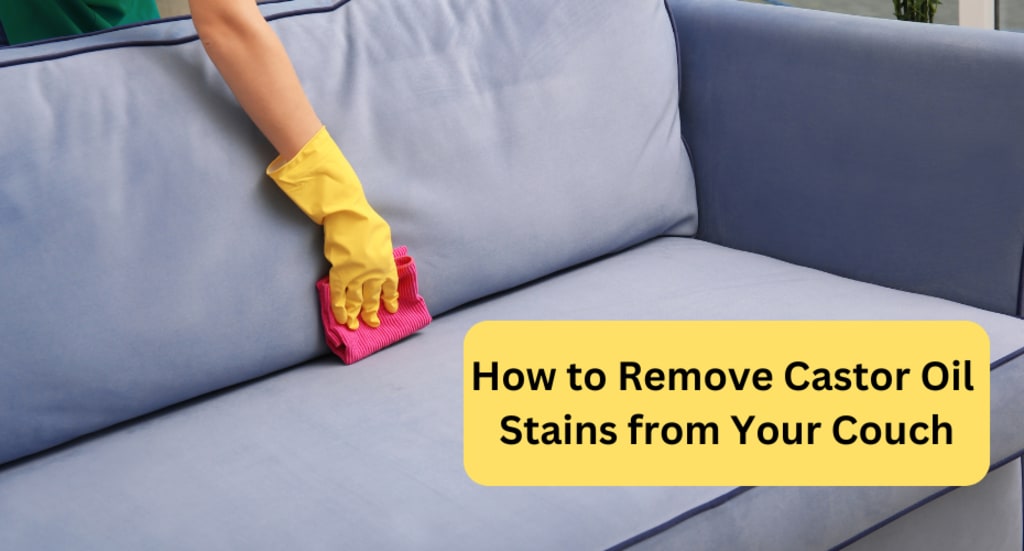How to Remove Castor Oil Stains from Your Couch
Dealing with castor oil stains on your couch can be a frustrating experience. Castor oil is a thick, sticky substance that easily penetrates fabric, leaving behind stubborn stains that are difficult to remove. Whether it's a spill from a home remedy session or an accidental mishap, it's essential to address the stain promptly to prevent permanent damage to your furniture.

Removing castor oil stains from your couch is important not only for aesthetic reasons but also for maintaining the fabric's integrity and ensuring a clean, welcoming living space. Ignoring such stains can lead to deeper fabric penetration, making future cleaning efforts even more challenging. This guide will walk you through a step-by-step process to effectively remove castor oil stains, using common household items and a bit of elbow grease.
Materials Needed
Before diving into the cleaning process, gather the following materials to ensure a smooth and efficient stain removal:
• White vinegar
• Baking soda
• Clean cloth
• Dishwashing liquid
• Warm water
• Vacuum cleaner
• Bucket
Having these items ready will help you tackle the stain promptly and effectively.
Preparing the Stain
`
The first step in dealing with a castor oil stain is to blot the affected area with a clean cloth. This helps to absorb as much of the excess oil as possible. Avoid rubbing the stain, as this can spread the oil further into the fabric fibers. Instead, gently press the cloth onto the stain, using a fresh section of the cloth as needed.
Testing a Small Amount of White Vinegar on an Inconspicuous Area
Before applying any cleaning solution to your couch, it's crucial to test it on an inconspicuous area first. White vinegar is generally safe for most fabrics, but it's always better to be safe than sorry. Apply a small amount of white vinegar to a hidden area of the couch and wait for a few minutes to ensure that it doesn't cause any discoloration or damage.
Applying White Vinegar to the Stain
Once you've confirmed that white vinegar is safe for your couch fabric, you can proceed to apply it to the stain. Pour a small amount of white vinegar directly onto the stained area. The acidity of the vinegar will help break down the oil, making it easier to remove. Allow the vinegar to sit on the stain for a few minutes to penetrate and loosen the oil.
Removing the Stain
Blotting the Stain with a Clean Cloth
After allowing the white vinegar to sit for a few minutes, blot the stain again with a clean cloth. This will help lift the oil and vinegar mixture from the fabric. Continue blotting until no more liquid is being absorbed by the cloth.
Sprinkling Baking Soda Over the Stained Area
Baking soda is a natural absorbent and deodorizer, making it an excellent choice for tackling oil stains. Sprinkle a generous amount of baking soda over the stained area. The baking soda will help absorb any remaining oil and neutralize any lingering odors from the vinegar.
Allowing the Baking Soda to Sit for 15-20 Minutes
Give the baking soda some time to work its magic. Allow it to sit on the stained area for 15-20 minutes. During this time, the baking soda will absorb the oil and draw it out of the fabric fibers.
Vacuuming Up the Baking Soda
After the baking soda has had time to absorb the oil, use a vacuum cleaner to remove it from the couch. Ensure that you thoroughly vacuum the area to remove all traces of baking soda. This step is crucial for preventing any residue from remaining on the fabric.
Cleaning the Stain
Mixing Dishwashing Liquid with Warm Water in a Bucket
Next, it's time to clean the stain further to ensure all remnants of castor oil are removed. In a bucket, mix a small amount of dishwashing liquid with warm water. Dishwashing liquid is effective at breaking down oils and grease, making it ideal for this task.
Dipping a Clean Cloth into the Soapy Water
Dip a clean cloth into the soapy water solution, ensuring it is well-saturated but not dripping. The soapy water will help lift any remaining oil from the fabric and clean the area thoroughly.
Blotting the Stained Area with the Soapy Cloth
Gently blot the stained area with the soapy cloth, working from the outside of the stain towards the center. This technique helps prevent the stain from spreading. Blot the area repeatedly, rinsing the cloth in the soapy water as needed until the stain begins to lift.
Rinsing the Cloth and Repeating as Necessary
Rinse the cloth in clean water and blot the area again to remove any soapy residue. Repeat the process as necessary until the stain is no longer visible. Be patient and persistent, as removing castor oil stains can take multiple attempts.
Drying the Couch
Allowing the Couch to Air Dry
Once the stain has been successfully removed, allow the couch to air dry. Ensure the area is well-ventilated to speed up the drying process. Avoid using the couch until it is completely dry to prevent any new stains from forming.
Using a Fan or Hairdryer on a Cool Setting to Speed Up the Drying Process
If you need to speed up the drying process, you can use a fan or a hairdryer on a cool setting. Direct the airflow towards the stained area to help evaporate any remaining moisture. Avoid using a hot setting, as heat can cause damage to certain fabrics.
Checking for Any Remaining Stains and Repeating the Process if Necessary
Once the couch is dry, inspect the area for any remaining stains. If you notice any lingering traces of the castor oil stain, repeat the cleaning process as needed. It may take a few attempts to completely remove stubborn stains, so don't be discouraged if the stain is still visible after the first try.
Conclusion
Acting quickly is crucial when dealing with oil stains. The sooner you address the stain, the easier it will be to remove. Additionally, consider implementing some preventative measures to avoid future stains. For instance, using couch covers or throws can protect your furniture from accidental spills and stains.
If you're in the Pakenham area and find yourself struggling with stubborn stains, consider reaching out to professional couch cleaning Pakenham services. Couch cleaning experts in Pakenham can provide specialized treatments and techniques to ensure your furniture remains in pristine condition.
By taking prompt action and following the right steps, you can effectively remove castor oil stains and keep your couch looking clean and inviting for years to come.
About the Creator
Enjoyed the story? Support the Creator.
Subscribe for free to receive all their stories in your feed. You could also pledge your support or give them a one-off tip, letting them know you appreciate their work.





Comments
There are no comments for this story
Be the first to respond and start the conversation.